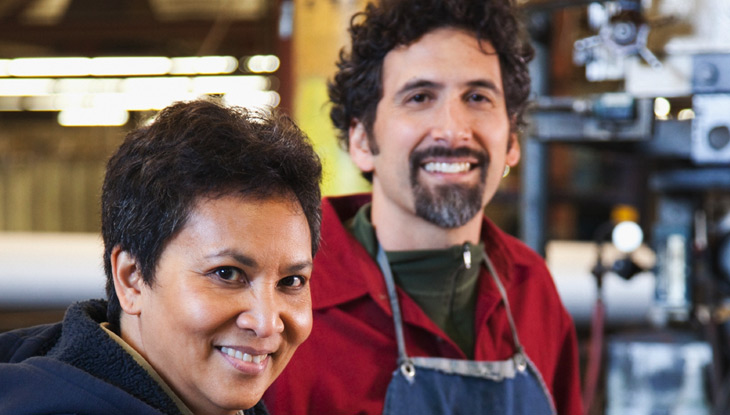For Business
“Employers no longer have the luxury of remaining on the sidelines”
Finding Workers with Skills that Match Their Needs
While there is some dispute about the existence or depth of a skills gap, many businesses report difficulty finding workers with the needed skill sets for jobs in their industry. The situation can differ by geographic region, by industry sector and by labor market.
In the skilled trades specifically the problem may only get worse as time goes on, since a significant percentage of the workforce is approaching retirement age, and the education and workforce systems may not be prepared to address the looming openings when current workers leave their jobs.
Many business leaders say that part of the challenge in finding trained workers comes from the negative perceptions or misperceptions of the skilled trades industry, with people picturing skilled trade jobs as they looked 40 or 50 years ago.

of Americans think we should invest more in manufacturing
would encourage their children to go into manufacturing as a career
Source: Leadership Wanted: U.S. Public Opinions on Manufacturing, Deloitte and the Manufacturing Institute
Partnerships can help solve this talent mismatch by developing a new pipeline for future workers as the older ones retire, and shifting the perception of skilled trades careers.
For Community Colleges
“Partnerships with industry will help community colleges rise to the challenge of preparing a workforce for the 21st Century”
For Community Colleges: Knowing What’s Valued and How to Teach It
Right now, many community colleges are not teaching the skills that are valued and required by local employers. Part of the challenge is that it is sometimes difficult for community colleges to easily obtain and keep up-to-date with businesses changing skill needs. There also can be cultural differences between how businesses and community colleges operate.
“We often don’t know where jobs are, and what skills are required to be successful in those jobs. Conversation needs to happen to ensure students are trained on the right tools and right skills sets.”
The challenge is how to ensure community colleges are keeping up-to-date with real-time information about what training is needed or the latest equipment being used, allowing the schools to develop students with academic, technical and professional skills. Some of that training will be in STEM disciplines, where skilled trades businesses are saying they can’t find workers with the math and technological knowledge needed in today’s advanced manufacturing careers.
While community colleges can have different goals, many are eager to partner with businesses to gain a better understanding of what training is needed to ensure their students can get a job when they leave school.
For Individuals
“I made up my mind that I had to do something… I went to a four year school, and that was supposed to be it… It was about shifting my attitude and realizing that there are other opportunities.”
“We are asking the students to play venture capitalists… I don’t think we want students in that situation.”
For Individuals: Finding a Job in an Ever-Changing Hiring Environment
In an ever-changing hiring environment, many individuals are seeking to understand the skills, certifications and degrees that individual businesses and the industry value, or want opportunities to prove they are the most qualified applicant for an open position—but don’t know where to start.
The good news is that as the economy continues to improve, there will be an increased demand in hiring, including in manufacturing and the skilled trades. But hiring patterns will be changing as well and it will be critical to have partnerships and systems in place that can produce workers with the right skills.
“More manufacturing is going to happen. We must match skills to this opportunity.”
The challenge is how to ensure community colleges are keeping up-to-date with real-time information about what training is needed or the latest equipment being used, allowing the schools to develop students with academic, technical and professional skills. Some of that training will be in STEM disciplines, where skilled trades businesses are saying they can’t find workers with the math and technological knowledge needed in today’s advanced manufacturing careers.
While community colleges can have different goals, many are eager to partner with businesses to gain a better understanding of what training is needed to ensure their students can get a job when they leave school.
